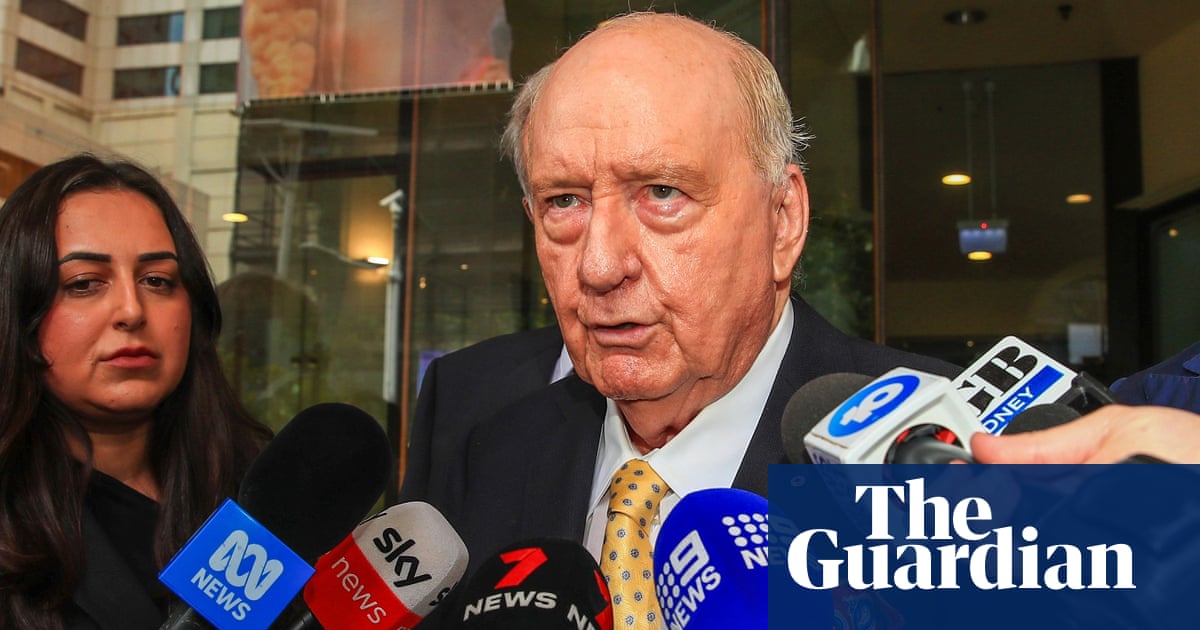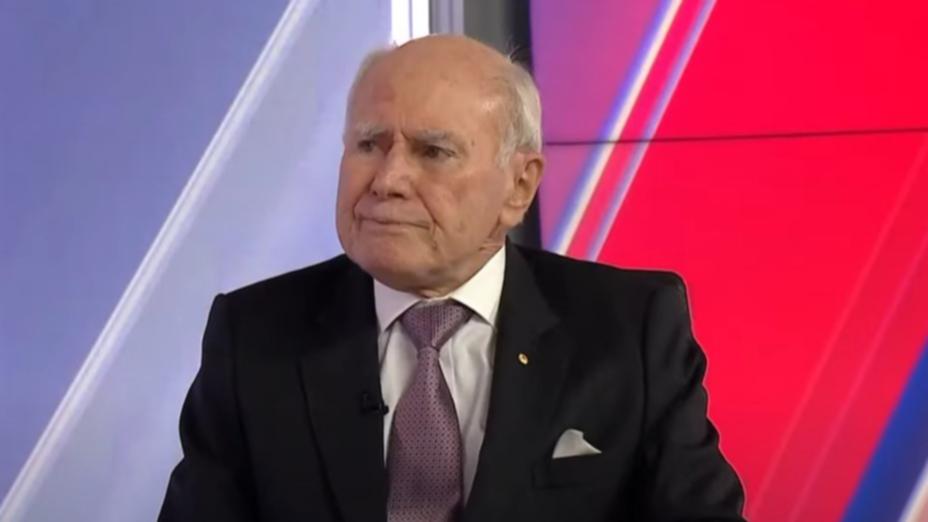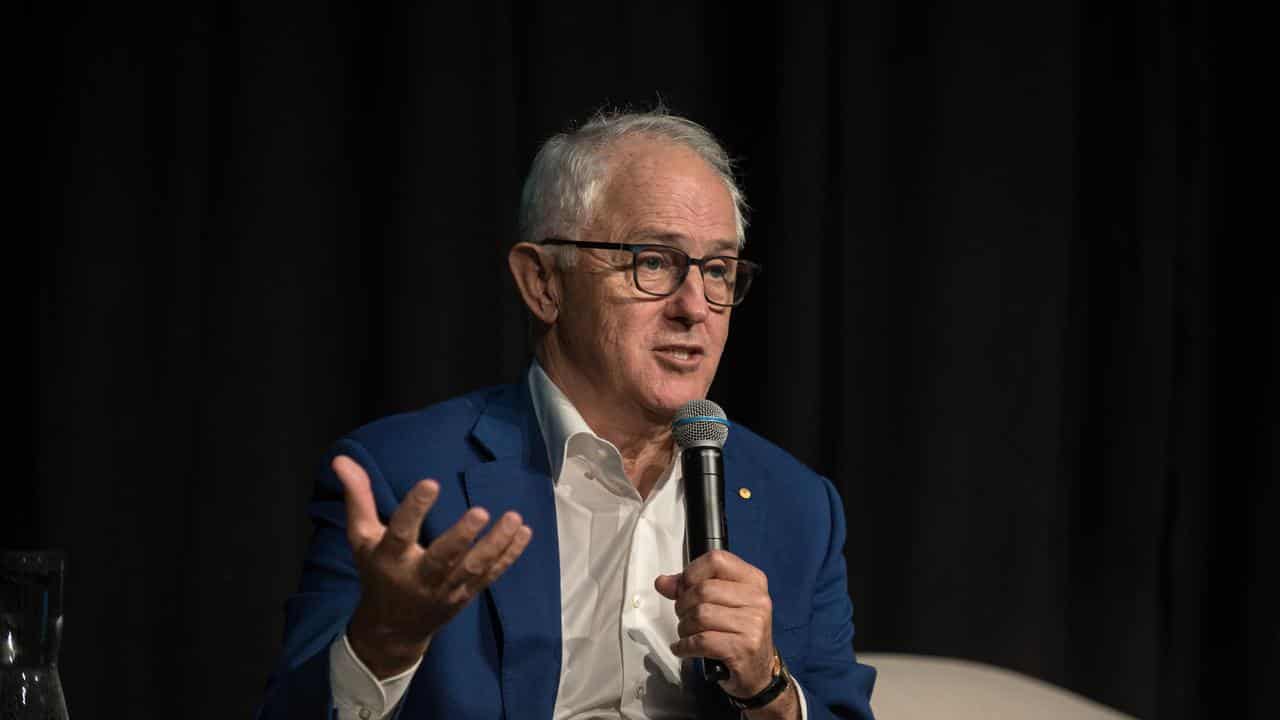Alan Jones once made politicians cower – but outside court, he was the one peppered with insults | Alan Jones

The scene of a frail senior with a walking stick moving slowly through a horde of reporters, as members of the public hurled abuse at him, marked a jarring transformation for a powerful man whose voice could once make prime ministers and premiers cower.
Alan Jones would wait until after his court appearance – once the judge had issued orders in relation to the allegations of 34 charges he is facing against 10 alleged victims – to regain his trademark voice, in what was a carefully orchestrated attempt at having the last say on the matter.
A defiant Jones told reporters he was not guilty of the 19 counts of assault with an act of indecency, 11 counts of aggravated indecent assault, two counts of sexually touching another person without consent and two counts of common assault he stands accused of.
Beyond the bizarre spectacle of an exposed Jones forced to face an uncomfortable barrage – a reversal of the reputation he built his career on – everything else about the veteran broadcaster’s first court appearance felt like a caricature of Sydney and the media arena he once ruled.
Reporters gathered at the entrance to Sydney’s Downing Centre court complex and waited for information from TV crews stationed outside the 83-year-old’s Circular Quay apartment building about when he had left home and was on his way. Many news outlets deployed multiple reporters to the court to ensure they could capture Jones’s entrance without risking missing out on a seat in the small courtroom upstairs.
Court sheriffs barked orders about where people could and couldn’t stand – and while they weren’t police, the image of this had echoes of Jones’s regular complaints of over policing and the “nanny state” on 2GB.
Critics of Jones arrived early, and posed for the media with placards. A supporter hanging around the entrance avoided reporters.
Seizing on the spotlight was Danny Lim, a beloved Sydney activist known for wearing sandwich board protest signs, with yet another a provocative slogan. Sydney Morning Herald journalist Kate McClymont – whose investigations led to the legal action against Jones – was approached by court attenders wanting a selfie.
When Jones finally arrived at about 10.15am – 45 minutes after the session of court he was listed for began – the mammoth media scrum magnetised to the car he emerged from.
Despite sporting a pocket square and tie, his shirt and blazer felt a far cry from the eye-catching colours he had become famous for dressing in.
He had to rely on his lawyers to guide him through the pack. While they could push through physically, they couldn’t defend him from the range of insults that a handful of detractors had been waiting hours, and possibly decades, to unleash.
“You fucking maggot,” one shouted. “Your media mates don’t love you now,” another said.
Jones kept silent.
Once he passed through security, Jones and his lawyers made their way to the fourth floor, where they had to awkwardly sit and wait among the reporters whose questions he had ignored minutes earlier.
Given the tiny layout of court 4.5, even reporters who had secured a seat early were routinely evicted as the room filled with parties arriving for their respective cases.
In this way, Jones was like any ordinary citizen. He had to wait for judge Michael Allen – the NSW chief magistrate – to make his way through a list of people fighting traffic infringements and young festival-goers allegedly caught with MDMA.
When Jones’s matter was finally heard, it was brief.
skip past newsletter promotion
Sign up to Breaking News Australia
Get the most important news as it breaks
Privacy Notice: Newsletters may contain info about charities, online ads, and content funded by outside parties. For more information see our Privacy Policy. We use Google reCaptcha to protect our website and the Google Privacy Policy and Terms of Service apply.
after newsletter promotion
While his intention to plead not guilty was the main result from Wednesday’s proceedings, judge Allen used the opportunity to warn journalists to behave.
“What infrequently interests the community is not always in the community’s interest,” Allen said.
He appeared to spend more time reminding the “very responsible press” gathered – most of who were standing in the room that could seat no more than 30 – to report “factually and impartially” than he did explaining to Jones the details of how a jury would work and where proceedings would go from here.
In just a few minutes, the hearing was over, and Jones allowed the media to gather back downstairs before he left, so they would be in prime position to hear him read from a prepared statement.
All of sudden, the projection of a helpless old man disappeared, and he spoke with the flow and pitch that built his broadcasting career.
“I will not be engaging in a running commentary in the media, but I want you to understand this. These allegations are all either baseless or they distort the truth.”
He continued: “I have never indecently assaulted these people. The law assumes that I’m not guilty.
“And I am not guilty.”
As he walked away from the court and into his ride, he was peppered with insults.
“The mighty have fallen,” yelled one bystander.




